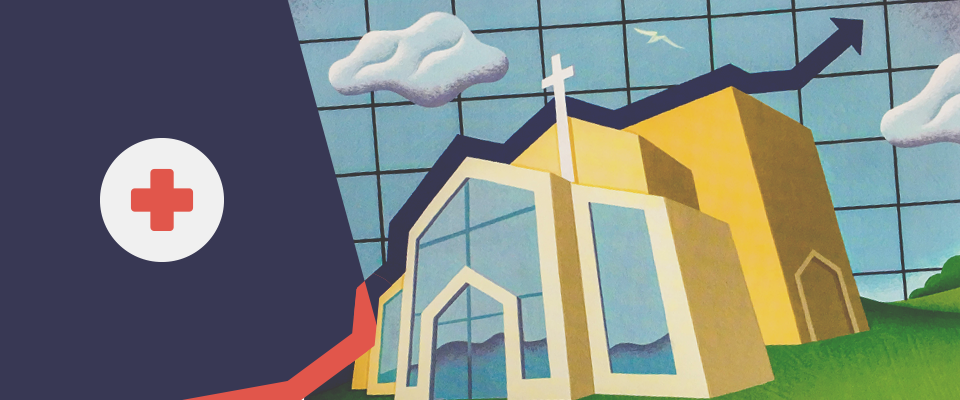Due to both low construction costs and low interest rates, a lot of growing churches are in the market for a loan. Most people are familiar with residential mortgages, but a church is considered a commercial enterprise, requiring a commercial mortgage. In order to accurately compare mortgage products to find the solution that is best for your church, it is important to understand the key differences between residential and commercial loans as well as the terminology used to describe the various products.
One of the biggest differences with a commercial mortgage when compared to a residential loan is the term, or length of time until maturity of the loan versus the amortization, or payment schedule, of the loan.
To best understand this difference, let’s look at a typical 30-year residential mortgage. The amortization and the term are both 30 years. That means your payments are scheduled out over 360 monthly fixed payments, or 30 years (the amortization), and you also have 30 years to repay the loan (the term). With a 15-year mortgage, your payments are scheduled out over 15 years, and you have 15 years to repay the loan.
With commercial mortgages, however, the amortization and term are usually different amounts of time. So even though your payments are scheduled out over a certain number of years, you may not have that same number of years to repay it. For instance, if the term of the loan is a shorter amount of time than the amortization, the entire remaining principle balance will be due at the end of the term. This is called a balloon payment.
If you don’t have cash to pay this balloon payment (the entire remaining balance of the loan), then you will have to refinance and get a new loan. That’s why it’s important to consider the term of the loan even before you look at the other factors, such as the interest rate and closing costs.
Just like in residential mortgages, the shorter the term of a commercial loan, the lower your interest rate will be. For example, the rate on a 15-year residential mortgage is generally lower than a 30-year. With commercial loans, most banks and credit unions offer terms as short as 3 or 5 years.
While the interest rate with such a short term can be enticing, it can end up costing you much more in the long run.
Here are some reasons why:
- If you refinance a balloon note when it’s due, you have to pay closing costs again (including any origination fees and third-party fees like appraisals and surveys) to borrow the same money you already had borrowed.
- When you refinance your balloon note, your new loan will be subject to whatever the interest rate market is at the time. You have no guarantee or cap on how much your rate may increase with the new loan, and there is no way to predict what interest rates will be at that time.
- If you look at the amortization schedule for your residential mortgage, you’ll notice that the bulk of the interest is paid at the beginning of the loan. When you refinance a balloon note, it’s like starting over. You will again be paying more interest and very little principal with each payment.
- When you refinance, you must qualify for the new loan. If there are changes in your property value, revenue, personnel costs, etc., you could find yourself in a different situation than when you borrowed the money the first time. In unfortunate cases where a bank can’t or won’t refinance a church loan, it leaves the church scrambling to find someone else to lend them the money they need so that they can keep their property.
Consider the following best-practice recommendations when shopping for a church loan:
- Understand what interest rate terms may mean for you.
Many banks refer to balloon notes as “fixed rate loans.” This is somewhat deceiving. While “fixed rate” has a positive connotation in the residential market when the loan term is 15 or 30 years, on a 5-year balloon note, the rate is only fixed for the 5-year term. The benefit of an adjustable rate loan in the commercial mortgage market is that you know up front how high your rate is allowed to go. Plus, the loan is guaranteed to remain until you pay off the entire balance. - Don’t borrow more than you can afford.
Only consider your tithes and offering income when determining how much your church can afford to borrow. Designated income, such as missions and benevolence, should not be used to pay your mortgage. - Borrow for the longest period possible.
Having a longer amortization schedule (and therefore lower payments) can give you the flexibility in your budget for cash flow fluctuation. No matter how accurate your projection, some months your income will be lower than others. Don’t let your ministry suffer because you’re committed to a larger loan payment. - Pay off your loan as quickly as possible.
Some months your income may be higher than expected. Use that extra cash to pay down your debt. As you shop for loans, make sure you don’t have a prepayment penalty so that you can take every opportunity to make extra principal payments on your loan and save your ministry money on interest in the long run. - Mitigate the long-term risks to your ministry.
It is important that we are wise stewards of the ministry and resources God has entrusted to us. You can’t afford to look at the future of your ministry in 5-year increments. To avoid incurring the costs and risks of refinancing every few years, look for a loan with a longer term rather than a shorter term.
As you search for the loan solution that is best for your ministry, we invite you to contact us to discuss your options. Call 866.621.1787 to set up a time to speak with a loan consultant.



